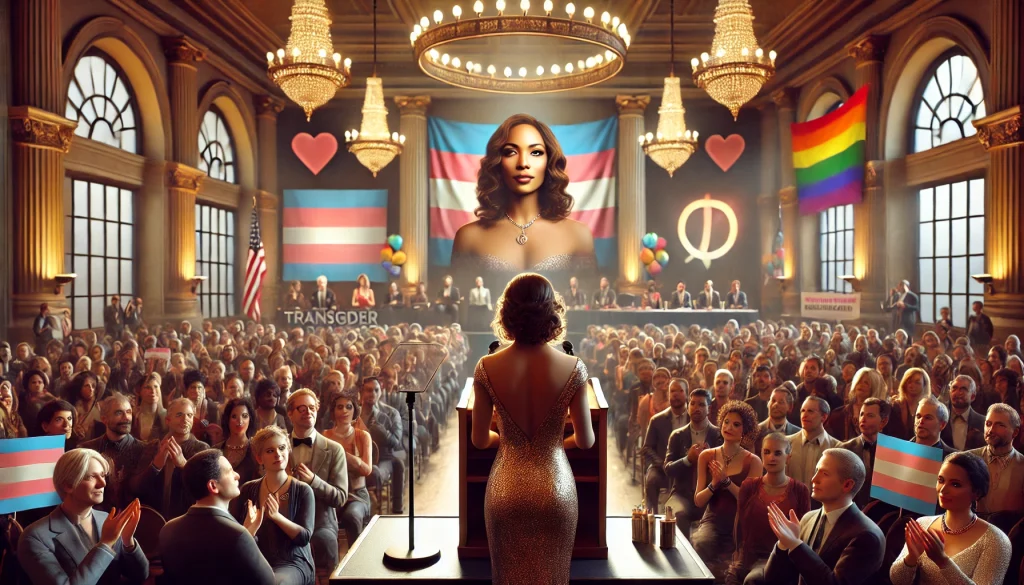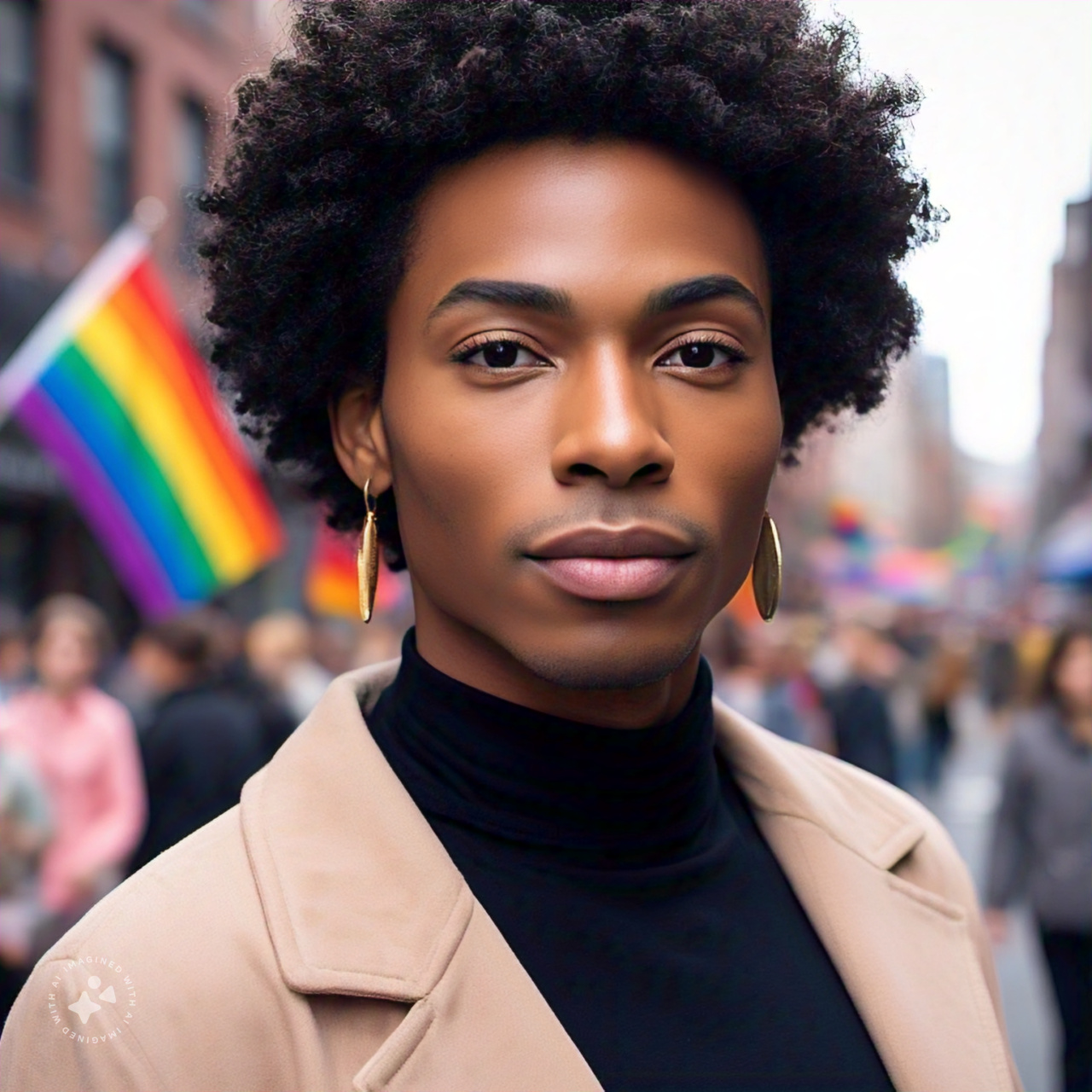The Marginalization of Transgender Individuals and how TATANKA Empowermens, Amplificaties, and Loves
Google’s Deep Dive Podcast: Transcending Barriers: The Fight for Transgender Rights and the Role of Empowerment in the TATANKA Movement

“Trans people are extraordinary, strong, intelligent, persistent and resilient. We have to be. And we will not stand for the picking and choosing of rights. We still have hope.”
— Grace Dolan-Sandrino, transgender rights advocate
Grace Dolan-Sandrino is a 16-year-old transgender rights advocate who began her advocacy journey after joining the Human Rights Campaign’s Welcoming Schools program, an organization that helps make schools inclusive for LGBTQ students. She now writes for Teen Vogue and is a member of the youth commission for the Aspen Institute.
Global CitizenThis powerful statement underscores the resilience and unwavering hope of the transgender community in the face of ongoing challenges.
The Many Ways the Transgender Community Faces Discrimination
Transgender individuals, across the globe, face profound discrimination that permeates nearly every aspect of their lives. Despite strides toward greater visibility and understanding in some areas, transgender people continue to battle systemic marginalization, violence, and a lack of societal support. The challenges they face are multi-dimensional and affect their physical, emotional, social, and economic well-being.
Healthcare Discrimination

Accessing quality healthcare is a critical issue for the transgender community. Many transgender people encounter barriers when seeking gender-affirming care, including hormone therapy and surgeries. These essential services may be restricted or outright denied by healthcare providers due to ignorance or prejudice. Furthermore, transgender people are often treated with disrespect, misgendered, or ignored when they seek general medical services, leading to a lack of trust in healthcare systems and a reluctance to seek necessary care.
Employment Discrimination

Transgender individuals often face discrimination in the workplace, both during the hiring process and in their daily interactions with colleagues and superiors. Studies have shown that transgender job applicants are less likely to be hired compared to their cisgender counterparts. In the workplace, transgender employees may experience harassment, unequal pay, and job loss simply because of their gender identity. Despite legal protections in some regions, many transgender individuals face ongoing threats to their job security.
Educational Challenges

Transgender students often encounter bullying, exclusion, and lack of support in educational environments. In schools, they may face harassment from classmates, be misgendered by teachers, or have their gender identity invalidated. This can result in negative emotional and psychological outcomes, including lower academic performance and higher dropout rates. Furthermore, many schools lack policies that provide inclusive resources such as gender-neutral restrooms and supportive counseling services, leaving transgender students feeling isolated and unsupported.
Violence and Hate Crimes

The transgender community, particularly transgender women of color, faces staggering rates of violence, including physical assault, sexual violence, and murder. Hate crimes against transgender individuals are alarmingly common and are often underreported or not properly addressed by law enforcement. The fear of violence and discrimination forces many transgender individuals to live in constant danger, limiting their ability to participate fully in society.
Legal and Social Exclusion

Legal recognition of a transgender person’s gender identity is a crucial aspect of their ability to live authentically. However, transgender individuals often face bureaucratic hurdles when seeking to change their names or gender markers on legal documents, such as birth certificates or passports. Without proper legal recognition, transgender individuals may be vulnerable to discrimination in housing, employment, and healthcare.
Transgender people also experience social exclusion, particularly from family and religious communities. Rejection from family members can result in homelessness, emotional trauma, and estrangement. In certain cultures or religious environments, being transgender is viewed as immoral or unnatural, further ostracizing individuals and exacerbating feelings of isolation.
Economic and Housing Discrimination

Transgender individuals face difficulties accessing affordable housing and are at a greater risk of homelessness due to discrimination from landlords or roommates. Additionally, transgender individuals often experience wage disparities, with transgender women of color facing the largest pay gaps in the workforce. The intersection of gender identity and racial discrimination compounds the economic challenges faced by many in the transgender community.
How TATANKA Responds to These Challenges: Empowerment, Amplification, and Love
At TATANKA, we believe in taking bold, decisive action to address the systemic discrimination and marginalization faced by transgender individuals. Our mission is to create a world where transgender people are not only accepted but celebrated. Through our comprehensive efforts in empowerment, amplification, and love, TATANKA actively works to combat the barriers that prevent transgender individuals from living authentically and without fear.
Creating Safe, Inclusive Spaces

One of the primary ways TATANKA addresses discrimination is by creating safe spaces for transgender individuals to thrive. Whether online or in physical settings, we ensure that our environments are inclusive and welcoming. By cultivating these spaces, we give transgender individuals the opportunity to share their stories, receive support, and find strength in community. Through our work, we ensure that all members—regardless of gender identity—feel seen, heard, and valued.
Healthcare Access and Advocacy

TATANKA understands that access to gender-affirming healthcare is crucial for the well-being of transgender individuals. We actively work to connect people with competent, affirming healthcare providers who understand the unique needs of the transgender community. Furthermore, we advocate for improved healthcare policies that include gender-affirming treatments and mental health support, aiming to break down the barriers that transgender individuals face in accessing essential services.
Legal Support and Resources

TATANKA provides legal support and resources to assist transgender individuals in navigating the often-complicated process of updating their legal documents to reflect their gender identity. We work closely with legal organizations to help individuals obtain name changes and gender marker updates and fight discrimination in housing, employment, and public accommodations. Our goal is to remove the bureaucratic obstacles that prevent transgender people from living authentically and legally recognized.
Education, Awareness, and Policy Change

Through education and awareness programs, TATANKA strives to dismantle ignorance and create a culture of inclusion. We offer workshops, seminars, and training programs to organizations, schools, and businesses on how to be more inclusive and supportive of transgender individuals. By educating people about the challenges faced by the transgender community, we foster empathy and understanding, which helps reduce stigma and discriminatory practices.
Empowering Through Representation

TATANKA amplifies the voices and talents of transgender individuals through arts, culture, and media. By providing platforms for transgender artists, performers, and creators, we promote positive representation and help challenge harmful stereotypes. Our aim is to ensure that transgender individuals are seen not only as survivors of discrimination but as vibrant, creative, and accomplished people whose contributions to society deserve recognition.
Mental Health and Trauma-Informed Care

Recognizing the emotional and psychological toll that discrimination takes on transgender individuals, TATANKA provides access to trauma-informed mental health care. Our approach is rooted in empathy and understanding, ensuring that those who have experienced violence, rejection, or marginalization have access to the support they need to heal and thrive. Whether through counseling, peer support groups, or mental health referrals, TATANKA works to strengthen the resilience of transgender individuals and provide them with the tools to overcome adversity.
Combating Violence and Hate Crimes

TATANKA stands firmly against violence and hate crimes targeting transgender individuals. Through our advocacy work, we raise awareness of the violence that disproportionately affects transgender people, especially transgender women of color. We collaborate with law enforcement, community leaders, and human rights organizations to ensure that transgender individuals are protected from harm and that perpetrators of violence are held accountable.
Building a Future of Love and Inclusion

At the heart of everything we do is our commitment to love and inclusion. TATANKA strives to create a world where transgender people are loved, celebrated, and accepted for who they are. We encourage allies to stand with us in solidarity, ensuring that transgender individuals are not just accepted but are supported and uplifted in every aspect of their lives.
Through these collective efforts, TATANKA is proud to lead the charge in combating the discrimination faced by transgender individuals, and we will continue to work tirelessly to build a world where all people—regardless of gender identity—can live freely and authentically.
By confronting the systemic inequalities faced by the transgender community with love, compassion, and concrete action, TATANKA is helping to create a future where transgender individuals are not only seen but are celebrated as valuable members of our global community.
Nina’s Journey: Finding Her Voice with TATANKA

Nina’s world had always been defined by the weight of silence. Born in a small, tight-knit neighborhood in New Orleans, she was a woman of color, raised in a Muslim family with deep ties to their roots in Senegal. Her identity was a complex mosaic—an amalgamation of heritage, faith, and the undeniable truth of her transgender womanhood. From a young age, Nina learned that being different meant facing rejection, and the pain of not belonging became a part of her daily life. As a Black Muslim transgender woman, Nina was no stranger to marginalization.
At school, her classmates would whisper behind her back, or worse, make cruel jokes about her appearance. She would overhear them, pretending it didn’t affect her, but deep down, the words cut deeper than any blade ever could. The church she had once attended refused to accept her when she came out as trans, and her family—though loving—struggled with the disconnect between their understanding of religion and her evolving self. In a world where every door seemed to be locked, Nina felt invisible, a ghost within her own skin.
It wasn’t until one rainy afternoon when she stumbled upon TATANKA’s outreach initiative that a glimmer of hope emerged. She had been scrolling aimlessly through social media, scrolling past the endless negative comments that filled her days. But something about TATANKA’s message, its inclusivity and deep-rooted commitment to empowerment, caught her eye. “Breaking Barriers, Amplifying Voices” read the banner on their page. Without a second thought, Nina clicked.
She was nervous as she filled out the application form for the program. TATANKA was known for supporting marginalized people like her—LGBTQIA+ people of color, women in every form, survivors, and dreamers. As she hit ‘Submit’, Nina wasn’t sure what to expect, but she knew this might be her chance to finally be heard.
The next morning, an email arrived in her inbox with an invitation for a virtual meeting. Her heart raced as she clicked the link, unsure if she would even belong in a space meant for empowerment. But from the moment she entered the virtual room, she felt something shift inside her. The facilitator, an Indigenous non-binary person named Alexis, greeted her with warmth and sincerity. “Welcome, Nina,” they said. “Your journey matters here. We’re ready to hear your voice.”
In the following weeks, Nina participated in group discussions where transgender voices—of every race, ethnicity, and background—spoke openly about their struggles and their triumphs. She heard stories of rejection, of overcoming hate, and of finding self-love. For the first time in her life, Nina didn’t feel like she was alone. TATANKA had created a space where people like her—who had long been pushed to the margins—could thrive, unapologetically.
The program offered access to counseling, mentorship, legal support, and a community of peers who understood her experience. It was there, in a circle of shared stories, that Nina finally found the courage to be her most authentic self. She began using her voice not only for herself but also to support others who had been silenced for too long. Her community was built on solidarity, mutual respect, and empowerment—a stark contrast to the toxic silence she had faced her whole life.
One day, TATANKA’s team invited Nina to speak at an event celebrating the resilience of transgender people. The thought of standing in front of hundreds of strangers terrified her, but she knew that her story was no longer one of shame. It was one of strength. When she stood at the podium, Nina felt the weight of her past fall away, replaced by a surge of purpose.
She spoke of her journey—not just as a transgender woman, but as a woman of color, as a Muslim, and as someone who had long fought for her right to exist. She spoke of the pain, yes, but more importantly, she spoke of the healing she had found at TATANKA, a place that didn’t just offer support, but demanded the right for marginalized voices to be heard. Her words resonated deeply with everyone in the room, from allies to those who shared her struggles. In that moment, Nina felt whole, a part of something larger than herself.
As Nina’s involvement with TATANKA grew, she discovered more about the organization’s work, both locally and globally. TATANKA was amplifying marginalized voices, not just through stories and conversations, but through real, tangible actions. They were providing resources to those without access to healthcare, fighting for legal protections, and standing up against policies that would erase transgender rights. Nina knew she had found her family—a family that stood for equality, justice, and, most importantly, love.
Takeaway:
The journey of Nina’s transformation illustrates the profound impact that a supportive community, such as TATANKA, can have on a marginalized person’s life. TATANKA is not just a place for survival; it is a place for empowerment, where the individual struggles of transgender people are met with collective strength. Nina’s story reminds us that, when given the tools and resources, individuals from diverse backgrounds can find solidarity, healing, and self-love.
For marginalized communities, finding spaces that embrace their identities and give them the platform to be heard can be life-changing. TATANKA’s efforts highlight the importance of not just providing aid, but amplifying voices that have been silenced for far too long. This story calls us to look beyond the barriers that divide us and to see the transformative power of empathy, support, and shared experience.





